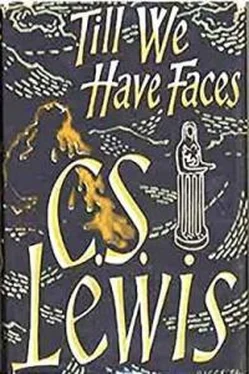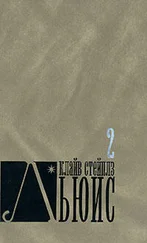The King’s forehead, I saw, was clammy now. The holiness and horror of divine things were continually thickening in that room. All at once, the Fox burst out, “Master, Master, let me speak.”
“Speak on,” said the King.
“Do you not see, Master,” said the Fox, “that the Priest is talking nonsense? A shadow is to be an animal which is also a goddess which is also a god, and loving is to be eating—a child of six would talk more sense. And a moment ago the victim of this abominable sacrifice was to be the Accursed, the wickedest person in the whole land, offered as a punishment. And now it is to be the best person in the whole land—the perfect victim—married to the god as a reward. Ask him which he means. It can’t be both.”
If any hope had put up its head within me when the Fox began, it was killed. This sort of talk could do no good. I knew what had happened to the Fox; he had forgotten all his wiles, even, in a way, his love and fears for Psyche, simply because things such as the Priest had been saying put him beyond all patience. (I have noticed that all men, not only Greek men, if they have clear wits and ready tongues, will do the same.)
“We are hearing much Greek wisdom this morning, King,” said the Priest. “And I have heard most of it before. I did not need a slave to teach it to me. It is very subtle. But it brings no rain and grows no corn; sacrifice does both. It does not even give them boldness to die. That Greek there is your slave because in some battle he threw down his arms and let them bind his hands and lead him away and sell him, rather than take a spear–thrust in his heart. Much less does it give them understanding of holy things. They demand to see such things clearly, as if the gods were no more than letters written in a book. I, King, have dealt with the gods for three generations of men, and I know that they dazzle our eyes and flow in and out of one another like eddies on a river, and nothing that is said clearly can be said truly about them. Holy places are dark places. It is life and strength, not knowledge and words, that we get in them. Holy wisdom is not clear and thin like water, but thick and dark like blood. Why should the Accursed not be both the best and the worst?”
The Priest looked more and more like a gaunt bird as he was speaking; not unlike the bird–mask that lay on his knees. And his voice, though not loud, was no longer shaking like an old man’s. The Fox sat hunched together with his eyes fixed on the table. The taunt about being taken in war, I guessed, had been hot iron to some old ulcer in his soul. Certainly, I would that moment have hanged the Priest and made the Fox a king if power had been given me; but it was easy to see on which side the strength lay.
“Well, well,” says the King, quickening his stride, “this may be all very true. I’m neither priest nor Greekling, I. They used to tell me I was the King. What’s next?”
“Being determined, therefore,” said the Priest, “to seek out the Accursed, we cast the holy lots. First we asked whether the Accursed were to be found among the commons. And the lots said No.”
“Go on, go on,” said the King.
“I cannot speak quickly,” said the Priest. “I have not breath for it now. Then we asked if it was among the Elders. And the lots said No.”
There was a queer mottled colour on the King’s face now; his fear and his anger were just on the balance, and neither he nor anyone else knew at all which would have the victory.
“Then we asked if it were among the nobles. And the lots said No.”
“And then you asked?” says the King, stepping up close to him and speaking low. And the Priest says:
“Then we asked, Is it in the King’s house? And the lots said Yes.”
“Aye,” says the King, rather breathless. “Aye. I thought as much. I smelled it from the beginning. Treason in a new cloak. Treason.” Then louder, “Treason.” Next moment he was at the door, roaring, “Treason! Treason! Guards! Bardia! Where are my guards? Where’s Bardia? Send Bardia.”
There was a rush and a jingle of iron and guards came running. Bardia their captain, a very honest man, came in.
“Bardia,” said the King, “there are too many people about my door today. Take what men you think you need and fall on those rebels who are standing with spears out yonder over against the gate. Don’t scatter them but kill. Kill, do you see? Don’t leave one of them alive.”
“Kill the temple guards, King?” said Bardia, looking from the King to the Priest and back at the King again.
“Temple rats! Temple pimps!” shouted the King. “Are you deaf? Are you afraid? I—I—” And his rage choked him.
“This is foolishness, King,” said the Priest. “All Glome is in arms. There is a party of armed men at every door of the palace by now. Your guards are outnumbered ten to one. And they won’t fight. Would you fight against Ungit, Bardia?”
“Will you slink away from my side, Bardia?” said the King. “After eating my bread? You were glad of my shield to cover you one day at Varin’s wood.”
“You saved my head that day, King,” said Bardia. “I’ll never say otherwise. May Ungit send me to do as much for you (there may be chance enough next spring). I’m for the King of Glome and the gods of Glome while I live. But if the King and the gods fall out, you great ones must settle it between you. I’ll not fight against powers and spirits.”
“You—you girl!” squealed the King, his voice shrill as a pipe. Then, “Be off! I’ll talk with you presently.” Bardia saluted and went out; you could see from his face that he cared no more for the insult than a great dog cares for a puppy making believe to fight him.
The moment the door was shut, the King, all quiet and white again, whipped out his dagger (the same he killed the page with the night Psyche was born), stepped up to the Priest’s chair in three long cat’s strides, shouldered the two girls away, and had the point of the dagger through the Priest’s robes and his skin.
“You old fool,” he said. “Where is your plot now? Eh? Can you feel my bodkin? Does it tickle you? As that? Or that? I can drive it into your heart as quickly or slowly as I please. The wasps may be outside but I’ve the queen wasp here. And now, what’ll you do?”
I have never (to speak of things merely mortal) seen anything more wonderful than the Priest’s stillness. Hardly any man can be quite still when a finger, much less a dagger, is thrust into the place between two ribs. The Priest was. Even his hands did not tighten on the arms of the chair. Never moving his head or changing his voice, he said:
“Drive it in, King, swift or slow, if it pleases you. It will make no difference. Be sure the Great Offering will be made whether I am dead or living. I am here in the strength of Ungit. While I have breath I am Ungit’s voice. Perhaps longer. A priest does not wholly die. I may visit your palace more often, both by day and night, if you kill me. The others will not see me. I think you will.”
This was the worst yet. The Fox had taught me to think—at any rate to speak—of the Priest as of a mere schemer and a politic man who put into the mouth of Ungit whatever might most increase his own power and lands or most harm his enemies. I saw it was not so. He was sure of Ungit. Looking at him as he sat with the dagger pricking him and his blind eyes unwinking, fixed on the King, and his face like an eagle’s face, I was sure too. Our real enemy was not a mortal. The room was full of spirits, and the horror of holiness.
With a beastly noise, all groan and snarl in one, my father turned away from the Priest and flung himself into his own chair and leaned back and passed his hands over his face and ruffled his hair like a man who is tired.
Читать дальше











